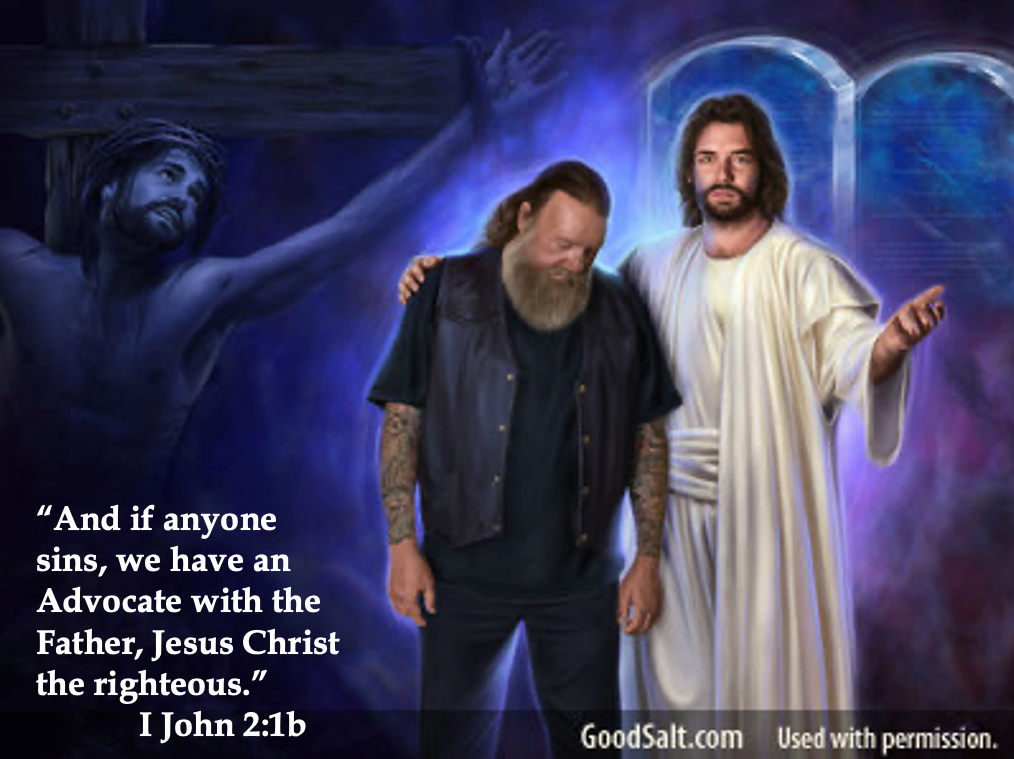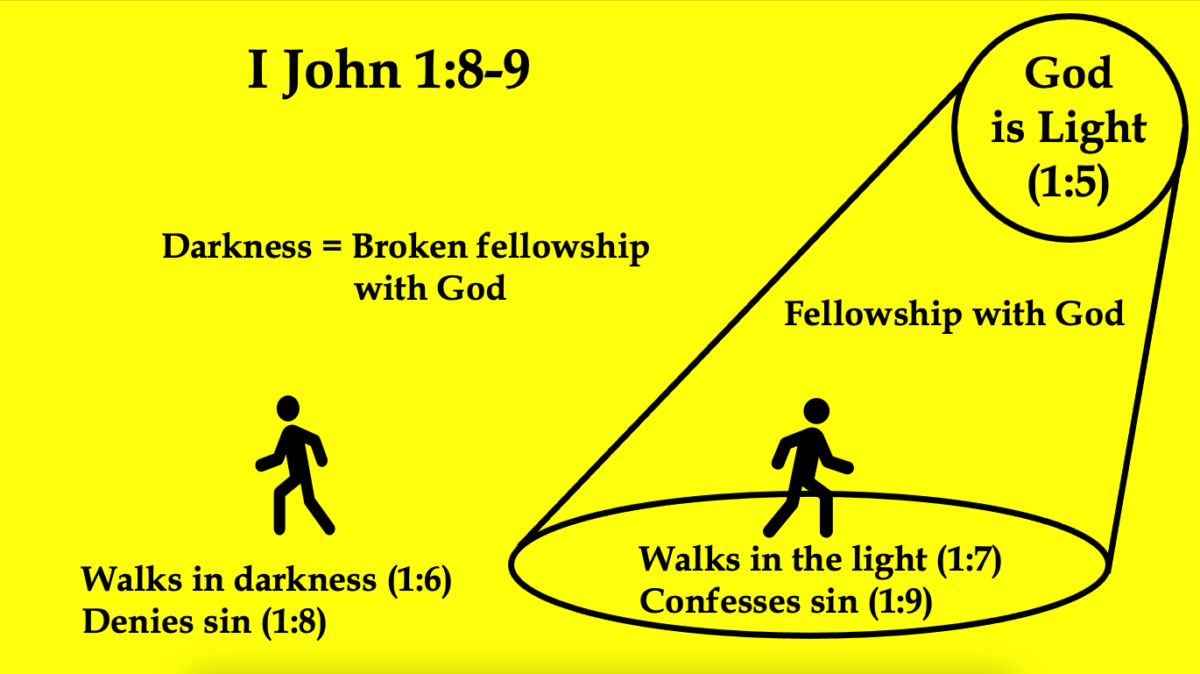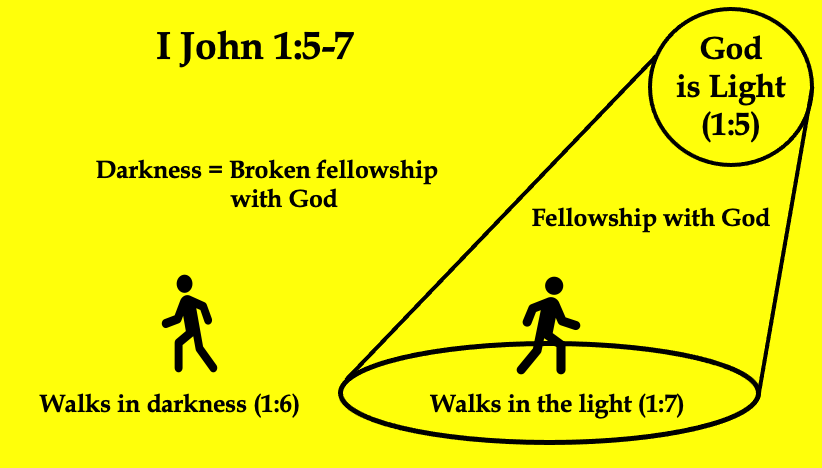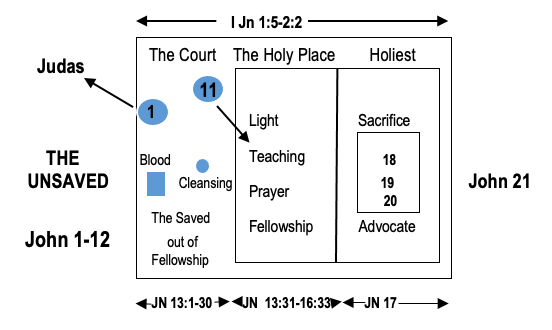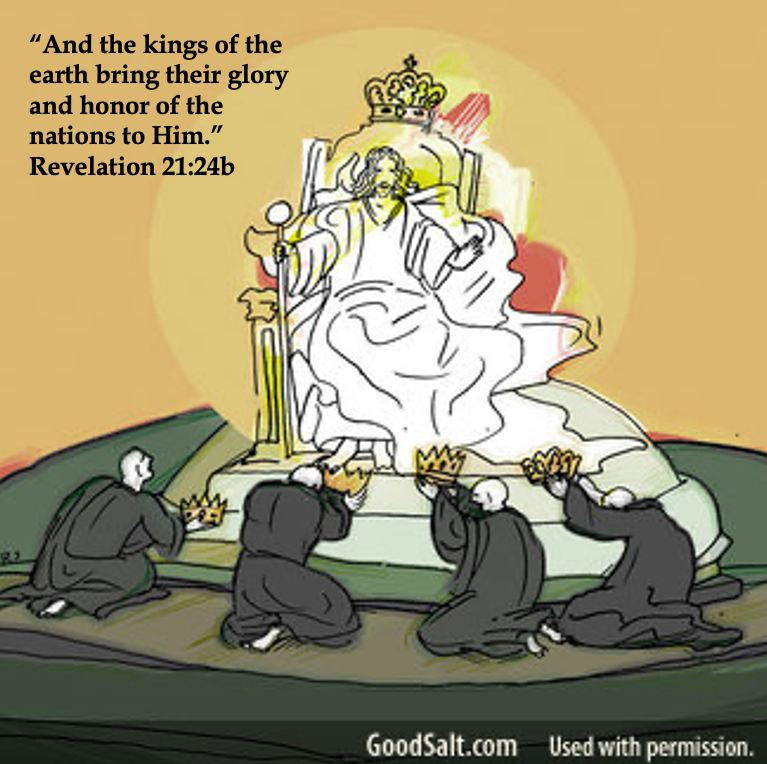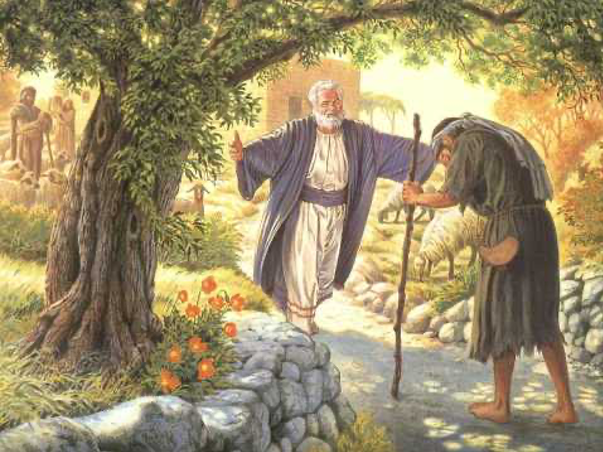“My little children, these things I write to you, so that you may not sin. And if anyone sins, we have an Advocate with the Father, Jesus Christ the righteous.” I John 2:1
When the apostle John announced the message he and the other apostolic eyewitnesses heard from the Lord Jesus “that God is light and in Him is no darkness at all” (1:5), he then addressed different responses from Christians to this message about God’s complete holiness. Some believers can lie by claiming to have fellowship or closeness with God while living in darkness or disobedience to Him (1:6). Others may walk in the light as God is in the light by being open and honest to what He reveals to them so they can enjoy fellowship with the Lord because of the all-sufficient cleansing blood of Jesus Christ (1:7).
While experiencing true fellowship with God as they walk in the light with Him, a Christian may deceive himself and claim to “have no sin” (1:8a)which would mean he no longer needs the cleansing blood of Jesus Christ. To make such a claim means that God’s “truth is not in us” shaping our thoughts (1:8b). There is never a time in a Christian’s life when he or she does not need the cleansing power of Christ’s shed blood.
When the light of God makes us aware of our sin as we walk in the light, God instructs us to “confess” or agree with His conclusions about those specific sins so He can forgive them and restore our closeness or fellowship with Him (1:9a). Confessing our known sins to God also enables Him “to cleanse us from all” the unknown sins in our lives (1:9b).
But what happens when we discover specific sin in our lives while walking in the light and we claim we have not sinned? The apostle John tells us: “If we say that we have not sinned, we make Him a liar, and His word is not in us.” (I John 1:10). We are calling God “a liar, and His word is not in us” as a controlling influence when we deny the specific sins we have committed. We elevate ourselves above God and His Word so that we determine what is and what is not sin. We are telling God that His judgment of us is wrong, and He is therefore “a liar.” 1
For example, God’s Word forbids adultery (cf. Exod. 20:14). Jesus even taught that whoever looks at a woman to lust for her has already committed adultery with her in his heart (Matt. 5:27-28). But if a believer commits adultery with a woman physically or mentally and justifies it by saying, “Everyone is doing this,“ or “No one will ever know so it won’t hurt anyone,” he is calling God “a liar” and His Word is “not in” him in a controlling way at that point.
No Christian is under the influence of God’s Word when he denies the specific sin God’s Word reveals in his or her life. Since he denies what God’s light shows, he is making God a liar, which demonstrates that he does not have fellowship with God (1:6) Who is Light (1:5). 2
This denial of sin is what causes the burden of guilt in our lives. “Guilt is like the red warning light on the dashboard of a car. You can either stop and deal with the trouble, or you can decide the light is giving a false signal. The latter decision is big trouble.
“… Many a Christian has been stuck on the side of the road with engine failure because of ignoring the warning signal of guilt… When Hymenaeus and Alexander (I Tim. 1:19-20) ignored their consciences, they made a shipwreck of their faiths. It was Leo Tolstoy who said, ‘The antagonism between life and conscience may be removed in two ways: By a change of life or by a change of conscience.’” 3
By ignoring the guilt of sin in our lives, we are desensitizing our consciences to sin and to God. The longer we deny our sin and guilt, the more calloused our consciences become to the Lord and His Word.
The apostle John did not want his readers to think his insistence on the sinfulness of Christians (1:8, 10) or the simplicity of confession and forgiveness (1:9) are encouragements to sin, 4 so he writes: “My little children, these things I write to you, so that you may not sin. And if anyone sins, we have an Advocate with the Father, Jesus Christ the righteous.” (I John 2:1). Notice John’s fatherly love and concern for his readers when he addresses them as “My little children.” The Greek word translated “little children” (teknia) means “little born ones” 5 and is used seven times by the apostle in this epistle (cf. 2:1, 12, 28; 3:7, 18; 4:4; 5:21) and once in his gospel (John 13:33). 6 The word “My” adds a further note of tenderness here compared to John’s “we” statements in chapter 1. This does not require us to conclude John’s readers were his personal converts, but they were very dear to him. 7
All that John wrote in I John 1:5-10 (“these things I write to you”) is meant to have his readers (including us) take sin seriously (“that you may not sin”) and do all they can to avoid it (2:1a). This does not mean he expects them never to ever sin again (cf. 1:8, 10). His intent is not to encourage or excuse sin. The perceptive Christian will allow his sinful tendencies to put him on guard against them, so he does not sin.
John also understood that though we are to vigorously shun sin in our Christian lives, the fact is it can and does take place in the lives of believers. Hence, John writes, “And if anyone sins, we have an Advocate with the Father, Jesus Christ the righteous.” (2:1b). The word “if” in the phrase “if anyone sins” introduces a condition assumed to take place for the sake of the argument. 8
John does not want us to sin, but he knows none of us is perfect, so he assures us that “we have an Advocate with the Father, Jesus Christ the righteous.” What does the Lord Jesus do for the sinning Christian? Does He plead to God to keep us saved? This would not be necessary because in John’s gospel Christ guarantees that those who believe in Him for eternal life are secure forever (John 1:12; 3:15-16; 4:10-14; 5:24; 6:35-40; 7:37-39; 10:28-29; 11:25-26)! Since Jesus’ promises are true and He is faithful to keep them, the believer is eternally secure and there is therefore no need for Christ to plead with God the Father not to cast sinning believers away. 9
The word “Advocate” (Paraklēton) means “one who gets called to the side of another to help” 10 or “one who appears in another’s behalf, mediator, intercessor, helper.” 11 One possible idea in I John 2:1 is of a defense attorney who takes up the case of his client before a tribunal. 12 We are not to give up on our Christian life when we do sin. Satan accuses us when we sin (Rev. 12:9-10), saying to God, “Give him back. He does not love You anymore.”But Jesus steps in and defends us because He is “righteous” – He will do what is right for us.
Anderson notes that “while the use of the word for a ‘lawyer’ is possible, but ‘mediator’ is more likely. When we sin, we don’t need a lawyer (see Rom. 8:33-34), because no one can lay any charge against God’s elect, but we do need an intercessor, a mediator, a High Priest.” 13
How does the Lord Jesus express His advocacy of us? Luke 22:31-33 illustrates how Jesus intercedes for us right now as He sits next to God the Father in heaven. 14 In the context of this passage, the disciples had been arguing with each other at the Lord’s Supper about which of them was the greatest (22:24). Christ then challenged them not to look at greatness as the world does but to pursue greatness before God which involves faithful servanthood (22:25-30).
Before Jesus tells Peter he will deny knowing Christ three times (22:35), Jesus informs Peter that Satan has asked permission to sift him like wheat (22:31). The process of sifting removes unwanted chaff and pebbles from the wheat. There was something in Peter that God wanted to remove. But what is it?
After Jesus tells Peter how He will pray for him (22:32), Peter exclaims, “Lord, I am ready to go with You, both to prison and to death.” (22:33). Peter was determined to remain loyal to Christ in his own strength. But God must remove or “sift” this self-reliant attitude from Peter before He can greatly use him. Hence, the Lord allows Satan to sift Peter of the “chaff” or “pebbles” of self-reliance from his life.
Christ does offer encouragement to Peter (and us) when He says, “But I have prayed for you, that your faith should not fail; and when you have returned to Me, strengthen your brethren.” (Luke 22:32). This verse gives us insight about how Jesus serves as our Advocate when we fail Him. Christ prays three things for Peter (and us):
- “that your faith should not fail” – Jesus knows Peter is going to fail Him by denying three times that he knows Christ. But Jesus prays that Peter will not be so shattered by his failure that he gives up and leaves Christian service. Jesus is not looking for perfect Christians to serve Him. He is looking for faithful believers who get back up when they fall (22:30; cf. Psalm 37:23-24). Although “the gifts and the calling of God are irrevocable” (Rom. 11:29), the faith that appropriates those gifts is nevertheless subject to failure (2 Tim. 2:18). 15 Jesus intercedes for Christians that this will not happen.
- “and when you have returned to Me” – This means Peter would turn away from the Lord. But Jesus prays for Peter (and us) that we will return both to fellowship with Christ and to Christian service. Satan wanted to sift Peter of his faith, but the Lord wanted to sift him of his self-reliance. Jesus prays for us that our faith will not give out completely. It is also important to recognize that Peter’s leadership was not disqualified because he had weaknesses. God does not disqualify us because we have weaknesses. He sifts us.
- “strengthen your brethren” – Christ prays that when Peter is restored to fellowship and Christian service, he will be able to “strengthen” other believers because Satan will be seeking to knock them down and out of Christian service (cf. I Peter 5:8). This informs us that Jesus prays the sifting process will equip us to strengthen others. It is impossible to strengthen someone else unless you have been sifted yourself. Once we have been through the sifting process, we can offer comfort to others who are being sifted.
If you are a Christian who thinks you have failed the Lord so badly that you are forever disqualified to serve the Lord, Jesus wants you to know He has not given up on you nor has God the Father or God the Holy Spirit. In fact, the Holy Spirit also intercedes for you to help you in your weaknesses: “26 Likewise the Spirit also helps in our weaknesses. For we do not know what we should pray for as we ought, but the Spirit Himself makes intercession for us with groanings which cannot be uttered. 27 Now He who searches the hearts knows what the mind of the Spirit is, because He makes intercession for the saints according to the will of God.” (Rom. 8:26-27). When we encounter failure and pain (Rom. 8:18-25), we may not know exactly how to pray to God, so the Holy Spirit helps us by praying on our behalf (“makes intercession for us”) to God the Father, telling Him exactly what is on our hearts (8:26b). The word “groanings” expresses feelings of compassion for our weak condition. The Holy Spirit requests the Father’s help for us with deep compassion (cf. Ephes. 6:18).
Even though we cannot hear the Holy Spirit’s intercession for us, God the Father can hear and understand Him. So not only does the Holy Spirit pray on our behalf, but we have a heavenly Father “who searches” our hearts and “knows what the mind of the Spirit is” (8:27a).The Holy Spirit makes our hearts understandable to the Father. We can be assured that the Holy Spirit’s prayers for us are effective in securing God’s help for us because the Spirit prays on our behalf “according to the will of God” (8:27b).
For example, when our children were infants, my wife would tune in to each child’s wordless cry. She learned to distinguish a cry for food from a cry for attention, an earache cry from a stomachache cry. To me the sounds were identical, but not to their mother who instinctively discerned the meaning of the helpless child’s cry. The Holy Spirit has resources of sensitivity beyond those of the most discerning mother. The Spirit of God can detect needs we cannot articulate. So as the Spirit prays for us, He gives content and expression to our heavenly Father as to the deep things of our hearts. He makes us understandable to the Father. When we do not know what to pray the Holy Spirit fills in the blanks.
During times of failure, we need to know that God understands us. Even if we can’t express ourselves well, our compassionate Father in heaven will understand how we feel and what we need because of the intercessory work of His Son and the Holy Spirit in us. When we feel understood, we really begin to experience hope. Because if God understands our hearts and our needs, then He can do something about them.
But what assurance do we have that God the Father will listen to the advocacy of His Son after we have sinned? John tells us, “And He Himself is the propitiation for our sins, and not for ours only but also for the whole world.” (I John 2:2). The word “propitiation” (hilasmos) means “appeasement” or “expiation.” 16 Propitiation refers to the satisfaction God the Father felt when Jesus paid the penalty for all our sins (John 19:30). God’s holy demands were satisfied when He looked at the “Righteous” One’s nail-pierced hands on the cross. Jesus paid the penalty we deserved (“death” – Rom. 6:23b) in full when He took our place on the cross.
Therefore, we do not have to punish ourselves when we do sin because Christ has already taken our full punishment when He died in our place. Some of us may struggle to believe God has forgiven us after we confess our sins to Him (1:9). We may think we have sinned too much for God to pardon us, so guilt feelings persist long after we confess to the Lord. Satan can use such feelings to make believers doubt that their Advocate can secure God’s mercy when they do sin. But John wants us to know and believe that God is fully satisfied no matter how badly or often we have sinned.
Our sympathetic High Priest (Heb. 4:14-16) is seated at the Father’s right hand pointing to His nail-scarred hands and to the mercy seat as He prays for us. It is especially crucial for us to know and believe that the Father is completely satisfied after we have committed sin no matter how often or badly we have sinned. John assures us of this when he writes, “and not for ours only but also for the whole world” (2:2b).
“That’s why John lets us know in no uncertain terms that the death of Christ not only satisfied God’s anger against my sins and the sins of other believers, but also for the sins of the entire world (verses like John 14:19, 27, 30; 15:18; 16:33; and 17:6-26 should make it apparent that the world includes all unbelievers). That means the work of Christ was so great that it not only was sufficient to satisfy God’s anger against the sins of the believers, but also men like Nero, Hitler, Stalin, and Osama bin Laden. If His sacrifice was enough to satisfy God’s justice with regard to their sins, it is certainly enough to take care of mine and yours.” 17
Some erroneously conclude that since Christ’s death was the propitiation or satisfaction not only for the sins of believers but also for the entire world, then all the world (including non-believers) is saved and going to heaven (universalism). But this view fails to understand that verse 2 is only saying the world is savable because Christ died for all people. Only those who believe in Christ and His all-sufficient death on the cross are saved and going to heaven (Acts 16:31; John 3:14-18). 18
“The argument that if Christ paid for all human sin all would be saved is a misconception. The removal of sin as a barrier to God’s saving grace does not automatically bring regeneration and eternal life. The sinner remains dead and ‘alienated from the life of God’ (Eph 4:18). At the final judgment of the lost (Rev 20:11-15), sin as sin is not considered. Instead, men are ‘judged according to their works’ (Rev 20:12) to demonstrate to each that their ‘works’ give them no claim on God’s salvation.” 19
When Christians confess their sins to God, we must not be overwhelmed with our own sin because Jesus’ death on the cross fully satisfied God’s holy demand to punish sin. Christ’s intercession to the Father as our Advocate assures us of this.
Please understand that although Jesus Christ died for all people (I John 2:2; I Tim. 2:5-6), not all people will be saved and go to heaven. We must believe the gospel of Jesus Christ which says Christ died for our sins, was buried, and rose from the dead so that “whoever believes in Him should not perish but have everlasting life.” (John 3:16b; I Cor. 15:3-6). If you are not sure you have eternal life and a future home in Jesus’ heaven, Christ invites you right now to believe in Him alone for His free gift of eternal life.
To “believe in” (pisteuōn eis) Jesus means to be persuaded that He is speaking the truth and is therefore worthy of your trust. 20 If you are convinced Jesus is telling truth in John 3:16 and is therefore worthy of your trust, then believe or trust Christ alone (not your good life, prayers, or religion) to give you His gift of everlasting life. When you believe in Christ for His free gift of eternal life, you can be just as certain of heaven as the people who are already there. Knowing we are going to heaven is not a guess; it is a guarantee from Jesus Christ (John 14:1-3).
Prayer: Precious Lord Jesus, thank You for making it possible for sinners to have fellowship with a completely holy God. Thank You for being our Advocate before God the Father when we sin in our Christian lives. Your all-sufficient death guarantees our forgiveness when we confess our sins to God no matter how often or badly we have sinned. Thank You for interceding for us when we do fail so our faith does not fail. And as You pray for us, we can return both to fellowship with You and to Christian service so we can strengthen others who go through similar failures. There is always hope of redemption in You Lord Jesus. Please use us to share this everlasting hope with those who need it the most. In Your mighty name we pray, Lord Jesus. Amen.
ENDNOTES:
1. Tom Constable, Notes on I John, 2022 Edition, pg. 28.
2. Zane C. Hodges; Robert Wilkin; J. Bond; Gary Derickson; Brad Doskocil; Dwight Hunt; Shawn Leach; The Grace New Testament Commentary: Revised Edition (Grace Evangelical Society, Kindle Edition, 2019), pg. 590.
3. David R. Anderson, Maximum Joy: I John – Relationship or Fellowship? (Grace Theology Press, 2013 Kindle Edition), pp. 60-61.
4. Zane C. Hodges, The Bible Knowledge Commentary Epistles and Prophecy, Editors John F. Walvoord and Roy B. Zuck (David C. Cook, 2018 Kindle Edition), Kindle Location 3553.
5. Ibid., Kindle Location 3558.
6. Ibid.
7. Constable, pg. 30.
8. Ibid. The phrase kai ean tis hamartē is a third-class condition in the Greek text.
9. Hodges, The Grace New Testament Commentary, pg. 590.
10. Constable, pp. 30-31.
11. Walter Bauer, A Greek-English Lexicon of the New Testament and Other Early Christian Literature: Third Edition (BDAG) revised and edited by Frederick William Danker (Chicago: University of Chicago Press, 2000 Kindle Edition), pg. 766.
12. Hodges, The Bible Knowledge Commentary Epistles and Prophecy, Kindle Location 3566.
13. Anderson, pp. 65-66.
14. Ibid., pp. 66-67; Hodges, The Bible Knowledge Commentary Epistles and Prophecy, Kindle Location 3566-3575.
15. Hodges, The Grace New Testament Commentary, pg. 590.
16. Bauer, pg. 474.
17. Anderson, pp. 67-68.
18. Anderson writes, “Theologians usually distinguish between sufficient and efficient. The death of Christ was sufficient penalty to pay for the sins of the entire world, but only efficient for those who believe in Him. It’s like being given a gift certificate to Baskin Robbins. The gift has been paid for. That which was paid was sufficient to cover whatever the certificate says. But that certificate has no real meaning in your life until you go to Baskin Robbins and appropriate what was paid for you. Only then will you enjoy the gift. Before going to the store, the gift certificate was sufficient, but not efficient.” (Maximum Joy, pp. 68-70).
19. Hodges, The Grace New Testament Commentary, pg. 590.
20. Bauer, pg. 816.

